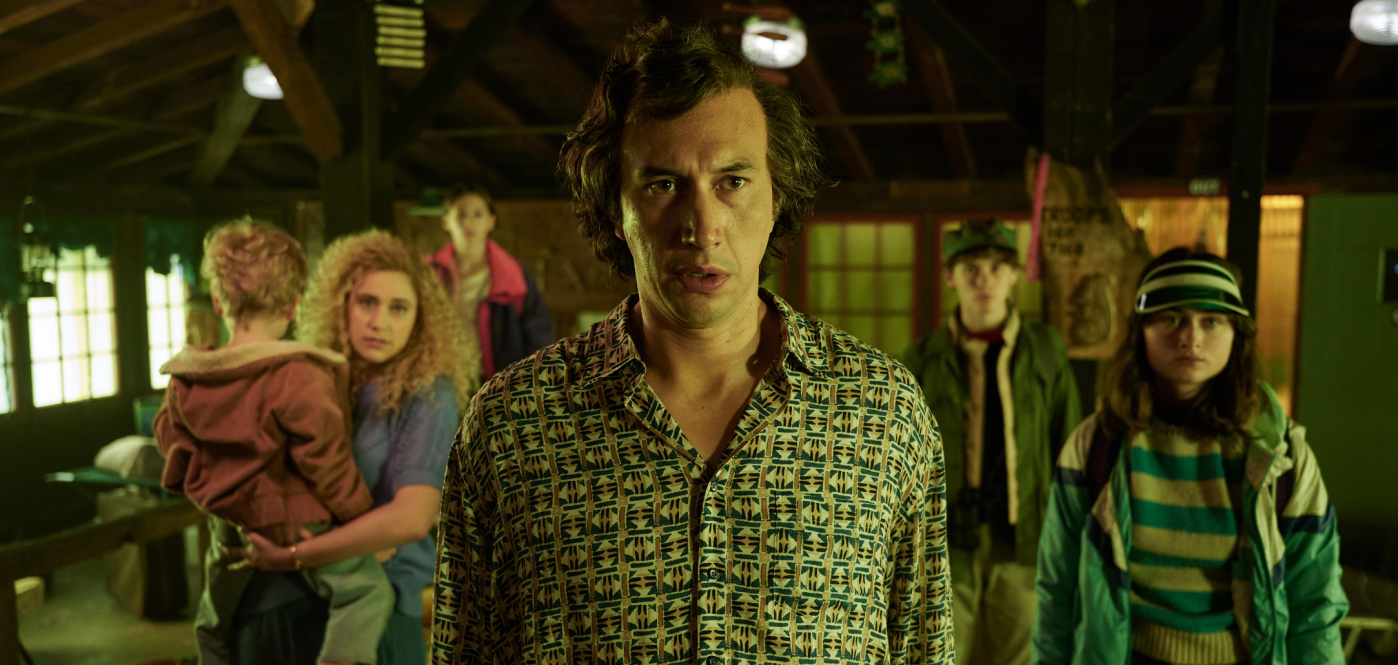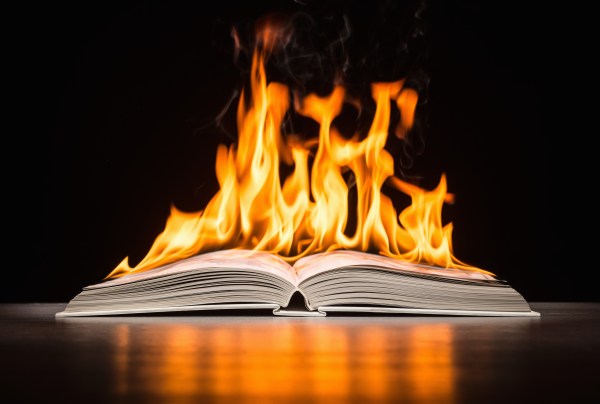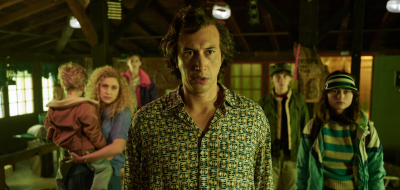True to its title, White Noise—Noah Baumbach’s adaptation of Don DeLillo’s 1985 novel—is an interminable, monotonous drone of a film. Baumbach’s reverence for the source material is clear, but his fealty to it results in an uneven writing that fails to provide any original or penetrating insights into the middle America it satirizes, or to establish any emotional resonance of its own. Taken as an absurdist work it similarly disappoints, veering awkwardly between existential ideas without amounting to anything profound. Throughout, there’s an air of smug self-satisfaction that’s especially ill-suited to a film as uninventive as this one, which excites only in the rare moments where Baumbach twists DeLillo’s story into his own shapes.
Jack Gladney (Adam Driver), a professor of “Hitler studies” at the College-on-the-Hill, seems to have achieved the American Dream. Successful and well-fed, he’s happily married to his fourth wife, Babette (Greta Gerwig), with whom he’s raising four children conceived in various relationships. Outwardly, their lives are tranquil and secure, composed of routine family dinners and trips to the grocery store. But there’s a rot beneath the surface that’s visible in Jack and Babette’s intense preoccupation with death and their awkward interactions with the children. When a chemical spill envelops the family’s quaint college town in a cloud of noxious smoke, they are forced to evacuate, and Jack’s exposure to the toxin threatens to uproot his carefully ordered existence.
Driver’s bumbling performance is the film’s most compelling feature, and it’s complemented nicely by Gerwig’s neurotic mumblings and the charmingly dry delivery of the child actors. What’s problematic, however, is the script, which lifts its dialogue almost verbatim from DeLillo’s text. The characters speak in inanities, gibbering incessantly to distract from the helplessness and alienation they feel in a world driven by consumption. Every line is brittle and unnatural, and when Jack verbally spars with his fellow academic, and hopeful pioneer of “Elvis studies,” Murray Siskind (Don Cheadle), the effect is akin to being stabbed repeatedly in the ear.
DeLillo’s intent was to lampoon the warped state of American institutions, and Baumbach clearly believes his targets are just as deserving of mockery today. In White Noise, professors teach classes on car crashes in American cinema and speak exclusively in pompous speeches while saying nothing of substance. At home, Americans of all professions spend their nights gawking at the television, watching global tragedies unfold with detached indifference. They view the local supermarket as a holy place—a sprawling paradise where brand names are displayed on oversized signs and products line the aisles in identical, radiant packaging. But commenting on the hollowness of academia, the allure of consumerism as a substitute for real fulfillment, and the dehumanizing influence of technology was hardly new or challenging in 1985, and Baumbach does nothing to update or refine DeLillo’s observations. Exchanges between the characters that are clearly written to evoke belly laughs are usually worth little more than a snigger, largely thanks to the efforts of the cast, and the repartee only occasionally shows a spark of genuine wit. The film exudes pride in its own banal, obvious satire, even as it constantly repeats what few points it has to make and draws scenes out needlessly.
But when Baumbach indulges his own stylistic whims rather than mimicking DeLillo’s, White Noise can prove genuinely captivating. In the film’s second act, the “Airborne Toxic Event” brings with it a significantly improved sense of pace and a series of tense set pieces, which toy with disaster movie conventions in wry and unpredictable ways. These are buttressed by Baumbach’s often gorgeous cinematography, defined by a rich color palette that adds a peculiar beauty to the catastrophe. (A scene at a gas station, illuminated by flickering lights and thunderous purple clouds, is among the most visually arresting of the year.)
Some strange tonal digressions also occur throughout, adding a more organically surreal element to the film than the stilted dialogue can conjure. One subplot, concerning Babette’s addiction to a prescription drug, diverges at times into psychological horror, fusing sparse sound design with delicate camera trickery to surprisingly unnerving effect. The end credits, meanwhile, take the form of a music video, in which the entire cast performs an elaborately choreographed dance routine in the sacred supermarket. It’s art for art’s sake in the purest sense—a sequence with no thematic significance that’s designed simply to be an entertaining spectacle—and the effort required to execute it is clear in the frame. If Baumbach had brought this level of aesthetic audacity to the whole film, it could have succeeded purely in its disregard for convention. But instead, his piety to DeLillo’s vision constricted his own. At least, then, White Noise serves some purpose—it’s a vivid reminder to filmmakers that literature and cinema are distinct forms of art.






Please note that we at The Dispatch hold ourselves, our work, and our commenters to a higher standard than other places on the internet. We welcome comments that foster genuine debate or discussion—including comments critical of us or our work—but responses that include ad hominem attacks on fellow Dispatch members or are intended to stoke fear and anger may be moderated.
With your membership, you only have the ability to comment on The Morning Dispatch articles. Consider upgrading to join the conversation everywhere.